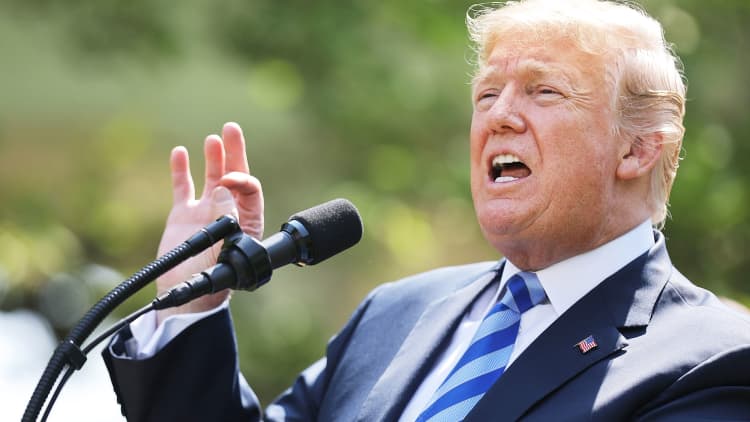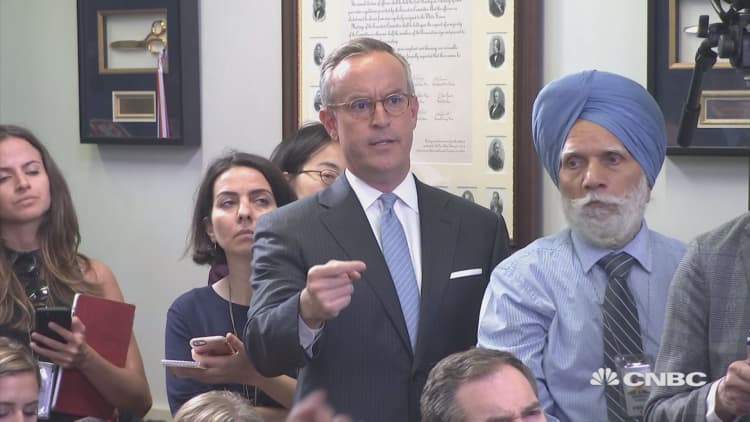
Amid all the scrutiny this week of Trump confidantes cashing in on their relationships with President Trump, just about everyone in Washington has weighed in: Yes, it's corruption! No, it's just Washington being Washington! Yes, Trump is drowning in the swamp!
White House Press Secretary Sarah Huckabee Sanders argues that payments by AT&T to President Trump's personal attorney Michael Cohen really represent "the definition of draining the swamp" because the Trump Administration didn't let the payments stop the Department of Justice from taking steps against the AT&T/Time Warner merger.
But one aspect of all this remains relatively unexplored: How does President Trump himself feel about his former employees cashing in under his name?
According to people who know the president well, Trump has a number of unwritten rules for his associates who are looking to profit from their long association with him – or even their short spin through the White House security gates.
You must be successful
This is a president who views life through a lens of financial success. So he doesn't have a problem with former associates profiting from his persona. Where previous presidents might have seen distasteful selling out, Trump sees lots of his guys – and they're overwhelmingly guys – building art-of-the-deal style fortunes for themselves. "As long as you can say you're kicking ass and being successful under Trump's name, he's fine with it," says one former Trump campaign aide.
Remember, political consulting is not lobbying. As a political consultant, you deal with your clients and give advice about how to frame messages, who to call, and how the president thinks about an issue privately.
As a lobbyist, you are the one making the calls – to the White House, to Congress and to the executive branch agencies. You are expected to move the policy decisions in the direction of your client, and therefore your client has some way to measure whether you're successful or not.
As a political consultant, there really is no way to measure success. And what appear to be powerful insights to a company grasping for information about a president can actually be pretty light work.

"Sometimes you don't even need to call over to the White House - if you've spent a year on the campaign trail with these people, you know them pretty well," says one person who knows the business. "You know who's handling what. And you know how your client can approach them in a way that will resonate."
The former Trump campaign aide sees Cohen's interaction with AT&T - which the company has since said was a mistake - as actually "somewhat brilliant."
"It was like paying for a jury consultant," the aide says. "What the f--- do you think happens every day in this town? All these other people are giving money to actually go do something – pay them off, throw them a fundraiser."
The key is not to build in too much overhead, insiders say. A number of political consultants work from home, or from their cars and restaurants around town. One veteran of the space gives this advice: "What you want is a monthly retainer, not an hourly deal, because it's a pain in the ass to keep track of the hours."
The traditional going rate for this kind of work is anywhere between $15,000 and $50,000 per month. But some former Trump aides have been able to charge as much as $100,000 per month, because clients were starved for information on the new president.
Never create a bad story
But all that success comes with a caveat: If the work draws any negative attention – a "bad story" in Trump parlance – the president could cut off access, publicly distance himself, or spread the word that you are out of favor.
This is something of a gray area, because it's never entirely clear to former aides and staffers what the president will have a problem with. In one recent case, a prominent Trump supporter was barred from a presidential fundraiser because Trump's aides decided he had become a political liability.
There's one giant exception that proves this rule: Michael Cohen himself. Disclosures about the president's former lawyer's payouts from companies including AT&T and Novartis have been front and center for a week, creating a quintessential "bad story" for Trump.
The president seems to have little respect for Cohen, routinely mocking him in private. That's why White House aides are flummoxed by the president's ongoing relationship with his New York fixer, who has broken this key rule and yet the president will not break with him.
One way to keep from embarrassing the president is to stay well within the norms of Washington DC's already pliable consulting and lobbying regulations. Cohen didn't do that, even with his big-name corporate clients. "If Novartis entered into a contract for $1.2 million sight unseen, that is unbelievable to me. I have never heard of anything like that," says one long-time Republican operative.
Never say you influence Trump
This one is key. In Trump's view, success flows from him to the team, not from the team to him. So any aides telling prospective clients that they can persuade the president to take a certain action or steer him away from a particular decision are treading on dangerous ground. Word does get back to Trump about some of the pitches his former aides are making to clients in his name – and he doesn't always like what he hears.
This rule has one big advantage for the political consultants, though: It means they don't have to register as lobbyists. The law requires anyone doing lobbying for more than a certain percentage of their time to publicly disclose their clients – and fees – on a regular basis. But consulting that doesn't involve making explicit pitches to lawmakers for action is entirely unregulated – and possibly a bigger industry in Washington than the more than the $3 billion a year lobbying business.
The former Trump campaign aide mentioned another former aide, Corey Lewandowski, as an example. Ultimately, it's up to the companies to decide how much they want to pay for access to the president - and how far they're willing to go. "He does have access - It's not bulls---," the aide said. "Then it comes down to, do you want to be involved in that? Do you need what Corey is selling?"


